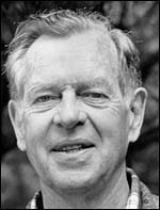
mythologist, writer
and lecturer
, best known for his work in comparative mythology
and comparative religion
. His work is vast, covering many aspects of the human experience. His philosophy is often summarized by his phrase: "Follow your bliss."
Joseph Campbell was born and raised in White Plains
, New York
in an upper middle class Roman Catholic family. As a child Campbell became fascinated with Native American
culture
after his father took him to see the American Museum of Natural History
in New York
where he saw on display featured collections of Native American artifacts.
We have not even to risk the adventure alone, for the heroes of all time have gone before us — the labyrinth is thoroughly known. We have only to follow the thread of the hero path, and where we had thought to find an abomination, we shall find a god; where we had thought to slay another, we shall slay ourselves; where we had thought to travel outward, we shall come to the center of our own existence. And where we had thought to be alone, we shall be with all the world.![]()
No tribal rite has yet been recorded which attempts to keep winter from descending; on the contrary: the rites all prepare the community to endure, together with the rest of nature, the season of the terrible cold.![]()
For when scrutinized in terms not of what it is but of how it functions, of how it has served mankind in the past, of how it may serve today, mythology shows itself to be as amenable as life itself to the obsessions and requirements of the individual, the race, the age. ![]()
The tribal ceremonies of birth, initiation, marriage, burial, installation, and so forth, serve to translate the individual’s life-crises and life-deeds into classic, impersonal forms. They disclose him to himself, not as this personality or that, but as the warrior, the bride, the widow, the priest, the chieftain; at the same time rehearsing for the rest of the community the old lesson of the archetypal stages.![]()
Wherever the hero may wander, whatever he may do, he is ever in the presence of his own essence — for he has the perfected eye to see. There is no separateness. Thus, just as the way of social participation may lead in the end to a realization of the All in the individual, so that of exile brings the hero to the Self in all.![]()
It is not only that there is no hiding place for the gods from the searching telescope and microscope; there is no such society any more as the gods once supported.![]()
The modern hero-deed must be that of questing to bring to light again the lost Atlantis of the co-ordinated soul.![]()
Heresy is the life of a mythology, and orthodoxy is the death.![]()
All cultures … have grown out of myths. They are founded on myths. What these myths have given has been inspiration for aspiration. The economic interpretation of history is for the birds. Economics is itself a function of aspiration. It’s what people aspire to that creates the field in which economics works.![]()

